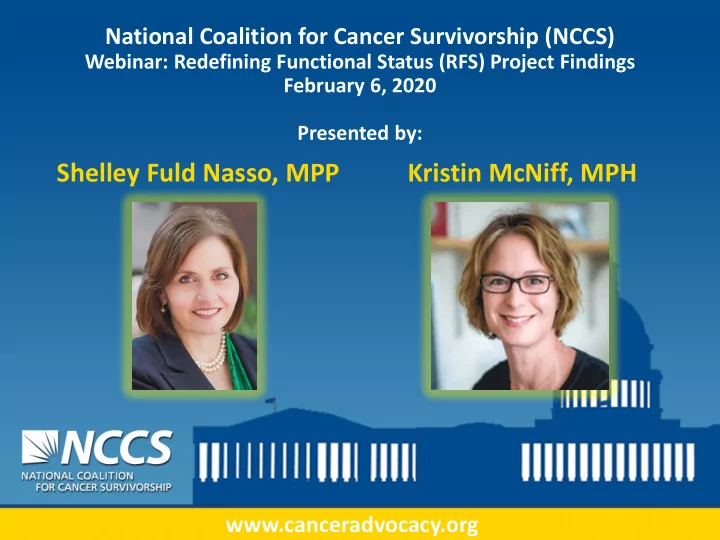

National Coalition for Cancer Survivorship (NCCS) Webinar: Redefining Functional Status (RFS) Project Findings February 6, 2020 Presented by: Shelley Fuld Nasso, MPP Kristin McNiff, MPH www.canceradvocacy.org
FACEBOOK: CancerSurvivorship TWITTER: @CancerAdvocacy HASHTAG: #LivingWithCancer
Impacting Policy - Empowering Survivors - Transforming Care
Survivors, Not Victims
What does “living well” with cancer mean to you? Provide your answer in the chat box
Cancer Quality Measurement • Focused on process – did the patient get the right test, right treatment, right procedure? • Limited outcome measures – avoidable hospitalizations and emergency department visits • What would quality measurement look like if it reflected what patients and caregivers say matter the most to them?
Measuring Functional Status • Patient-centered measure development project to define cancer outcome measure(s) in this critical area, using the Principles of Patient-Centered Measurement • Original Title: Return to Functional Status (RFS): Patient-Led Cancer Outcome Measurement • Funded by the American Institutes for Research (AIR), with support from the Robert Wood Johnson Foundation (RWJF): Pilot projects to implement Principles of Patient-Centered Measurement #LivingWithCancer
High Level Project Steps Convened Solicited input Developed Evaluated Developed diverse from cancer conceptual existing patient- committee of survivors definition of validated centered 10 cancer through various ‘return to surveys for best specifications survivors, as social media functional alignment with for RFS well as platforms status’ by the conceptual outcome Technical Expert cancer patients definition measures (PRO- Panel (TEP) and survivors PMs) Sufficiently detailed to allow for testing and validation in a subsequent initiative
Project Committees • RFS Committee • Members invited to reflect a diverse range of experiences • Charged with leading development of the RFS measure by defining the concept (via structured RAND Delphi approach); reviewing and contributing to the development of patient-centered specifications • Clinical/methodologist panel • Members who are experienced in cancer patient-reported outcomes, functional status research, measurement methodology, and implementation / clinical workflow • Charged with making recommendations to the RFS Committee and project team on methodologic and implementation issues
RFS Committee • Rebecca Esparza • Betsy Glosik • Matt Goldman • Candace Henley • Allen Hirsch • Kirby Lewis • Allison Rosen • Susan Strong • Desiree Walker • Dan Weber
Conceptualization Core challenge: • What does ‘return to functional status’ mean? • How can the concept be measured to evaluate quality of oncology care?
Project Methodology RFS Committee Social media Detailed brainstorm outreach literature review Survey 1 In-person Delphi RFS Delphi survey completed and meeting development scored Survey 2 Committee completed and refined prioritized scored outcomes
Social Media Questions • What personal/life activities, events or accomplishments do you consider when you think of a cancer survivor living well DURING cancer treatment? • What personal/life activities, events or accomplishments do you consider when you think of a cancer survivor living well AFTER cancer treatment? • What are the most important impacts on your quality of life from your cancer or cancer treatment? Did/does your care team help you address these challenges?
Conceptualization Methodology RAND Delphi Process Main steps: 1. Structured survey prepared, informed by literature review, committee brainstorming, social media outreach 2. Structured survey completed by RFS Committee members 3. In-person meeting to review and discuss survey responses; attention to areas of disagreement and uncertainty 4. Survey re-scored by RFS Committee 5. Results and and conclusions reviewed by RFS Committee, minor refinements made
Expectations Confirmed • ‘We should measure…’: Commonly used jargon often lacks meaning • Putting patients in the driver’s seat significantly changes the resulting measures • Patient committees can be successful in identifying system gaps as measurement priorities • Everyone brings personal experience to the table • Gaps in current system are such that measurement alone will be insufficient
Lessons Learned What we expected… What we found… Focus on/measurement of survivors in Commitment to include those receiving the post-treatment phase extended/chronic treatment as well Discussions of system gaps Reality of a system that lacks reliable expectations, norms, infrastructure to provide care that supports RFS Focus on return to previous activities A group of prioritized outcomes and set of (e.g. return to work) measures Concern about appropriate patient Concern about appropriate provider responsibility accountability
1. Renaming the concept 2. Prioritized outcomes for measurement of RFS 3. Resulting measure set Selected Results
Renaming the Concept • Immediate feedback from Committee during brainstorming – ‘return to functional status’ is not adequately descriptive • Following in-depth discussion at in-person meeting, Committee renamed the concept Redefining Functional Status
Prioritized Outcomes • Overall Quality of Life • Physical and mental health • Physical Function • Pain Interference • Fatigue Interference • Cognitive Function • Psychosocial Impact
RFS Measure Set Outcomes: prioritized Outcomes: patient experience of reported care outcomes (communication re: Process: Action side/late effects and taken when financial impact) indicated by survey responses Process: Survey- based assessment of priority outcomes
How Survivors Shaped the Project • Name of project: changed from “return to “Patient centered measurements are functional status” to “redefining functional hugely important and I didn’t status” recognize its value prior to participating in this study. Patients • Composition of committee: added committee aren’t always comfortable letting members with metastatic and chronic cancers their provider know what they are experiencing and having a quality • Scope of measurement: considered people measurement that allows a patient currently in treatment, as well as people who to share their concerns, issues or have completed cancer treatment changes can overcome the fear of speaking up.” • Measures specified: included process measures for functional status assessment, in addition to -Matt Goldman, Multiple Myeloma outcome measures Survivor and RFS Committee member 2 1
RFS Committee Members Allison Rosen, Colon Cancer Survivor Rebecca Esparza, Ovarian Cancer Survivor
www.canceradvocacy.org Email Lindsay Houff at Lhouff@canceradvocacy.org
Recommend
More recommend